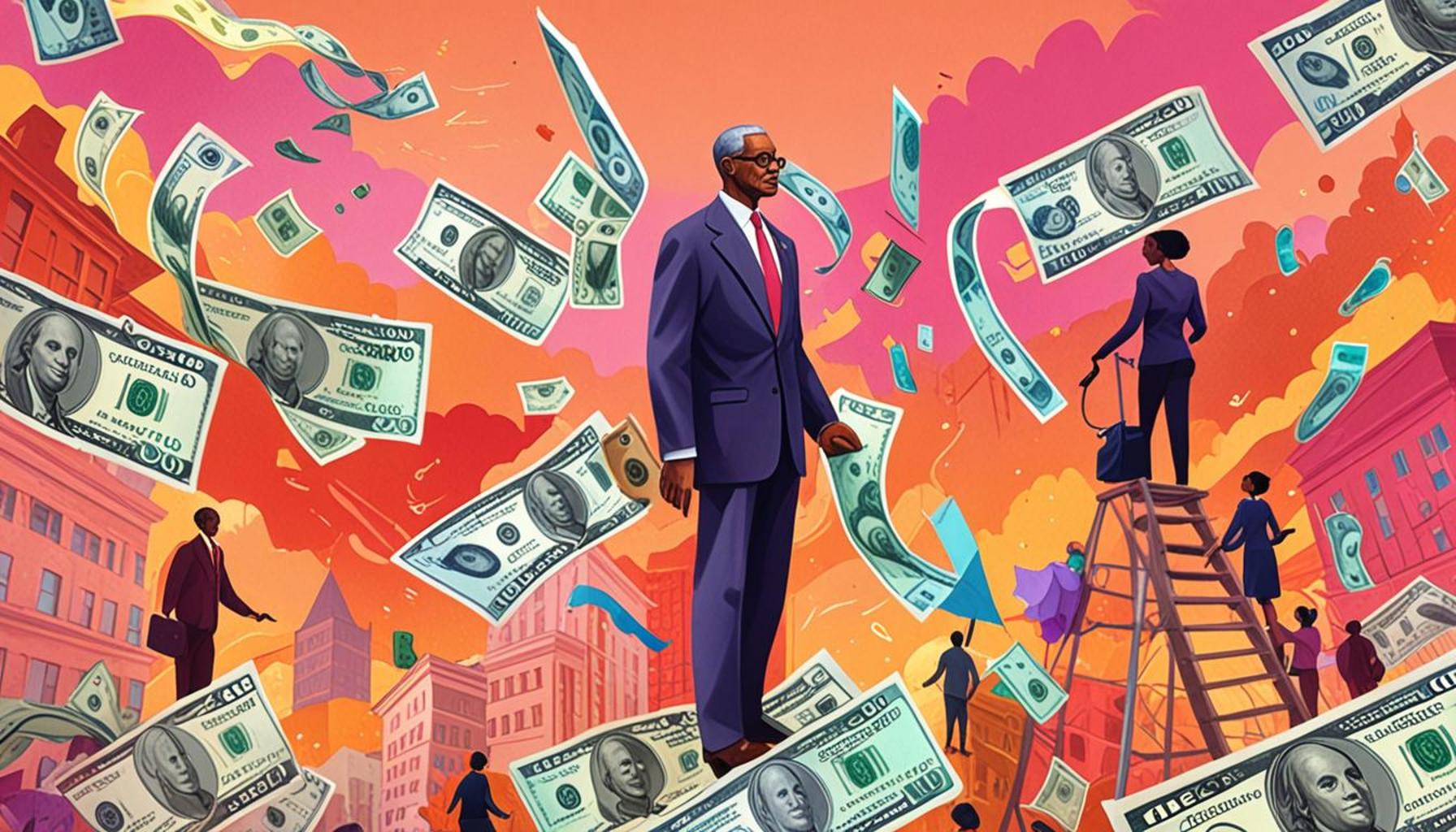The Role of Unemployment Benefits in Economic Recovery During Recessions

The Lifeline of Unemployment Benefits
During economic downturns, unemployment benefits serve as a critical lifeline for millions of Americans, providing essential support during times of financial distress. These benefits not only help mitigate the instantaneous effects of job loss but also play a significant role in fostering community resilience and economic recovery.
At the heart of unemployment benefits is their ability to provide immediate financial support to individuals and households. For many, these benefits are a vital source of income that covers basic necessities such as food, housing, healthcare, and transportation. For instance, during the COVID-19 pandemic, unemployment benefits expanded significantly, with many recipients receiving an additional $600 per week through the Federal Pandemic Unemployment Compensation program. This support allowed families to maintain their purchasing power, even amid massive job losses across various sectors.
Moreover, unemployment benefits have a broader economic impact. By stimulating economic activity, these benefits increase consumer spending, which is crucial for local economies. When individuals receive these funds, they often allocate them toward essential goods and services, supporting businesses that may also be struggling. In fact, studies have shown that every dollar spent on unemployment benefits generates approximately $1.50 in economic activity, emphasizing their importance in maintaining economic stability during downturns.
Beyond immediate financial relief, unemployment benefits support job seekers in pursuing new employment opportunities. By easing the financial burden of job loss, individuals have the leeway to invest time in finding suitable jobs or furthering their education. During the 2008 financial crisis, many individuals took advantage of this opportunity by enrolling in retraining programs, which ultimately formed a more skilled workforce that contributed to a faster recovery in subsequent years.
The expansion of unemployment benefits during recessions has proven essential for recovery, as seen during the 2008 financial crisis and the recent challenges posed by the COVID-19 pandemic. Programs have federally expanded and evolved to meet the workforce’s unique needs, demonstrating remarkable adaptability in times of crisis. For example, during the pandemic, initiatives like the Pandemic Unemployment Assistance program were introduced to extend benefits to those traditionally ineligible, such as gig workers and freelancers, showcasing the government’s responsiveness to the changing job landscape.
Exploring the influence of these benefits reveals their incredible importance in not only sustaining individual welfare but also stabilizing the larger economy. By examining the intricate connections between governmental support, community resilience, and overall recovery trajectories, we gain valuable insights into how unemployment benefits can serve as a crucial tool for societal recovery in times of uncertainty.
ADDITIONAL INSIGHTS: Expand your understanding here
Understanding the Impact of Unemployment Benefits
The significance of unemployment benefits during economic recessions cannot be overstated. These benefits represent a form of social safety net that helps ease the financial distress faced by individuals who have lost their jobs. As millions of Americans navigate the challenges of unemployment, the timely provision of these funds becomes essential, offering much-needed relief and stability. This, in turn, has ripple effects throughout the economy.
Each time the nation faces a recession, the role of unemployment benefits evolves, adapting to meet the needs of a changing job market. By providing a temporary income source, these benefits allow displaced workers to maintain their spending levels, which is crucial during downturns. When families are able to cover their living expenses, local businesses benefit as well, helping to prop up the economy during challenging times.
Understanding how unemployment benefits engage with various aspects of economic recovery involves looking at multiple factors:
- Consumption Patterns: Unemployment benefits directly influence consumption patterns. Studies reveal that consumers who are receiving these benefits tend to spend a higher proportion of their income, as they use these funds primarily for essential needs. This consumer spending is vital for businesses that rely on everyday sales to survive.
- Job Search Freedom: With the financial support that unemployment benefits provide, workers are not rushed back into employment but can take the time to seek positions that truly match their skills and career aspirations. This prolonged job search can lead to better job matches and increased overall productivity.
- Stabilizer for Local Economies: When individuals receive unemployment benefits, it creates a stabilizing effect on local economies. Businesses benefit from continued spending by unemployed individuals, thus reducing the risk of further job losses and bankruptcies.
The concept of economic multipliers also plays a crucial role here. Research indicates that for every dollar paid out in unemployment benefits, the economy can experience a return of up to $1.50 through increased spending. Thus, in times of economic downturn, maintaining robust unemployment benefits represents a smart investment for stimulating recovery.
While many look at unemployment benefits solely as a stopgap solution, the long-term implications are far-reaching. In addition to immediate financial support, these benefits help lay the groundwork for a more skilled workforce and resilient economy. By allowing individuals to pursue education or retrain for higher-demand roles, unemployment benefits help cultivate a labor market equipped to recover from economic downturns more effectively.
As we explore the intricacies of unemployment benefits further, it becomes evident that they serve not only as a critical source of support for individuals but also as an essential engine for broader economic recovery. Looking back at past recessions can illuminate how these benefits adapt to the ever-evolving economic landscape and their lasting impact on society as a whole.
| Advantage | Description |
|---|---|
| Stimulates Consumer Spending | Unemployment benefits provide essential financial support, enabling recipients to meet basic needs and stimulate local economies by maintaining their purchasing power. |
| Supports Job Creation | When individuals can sustain themselves through benefits, it revives businesses’ confidence to hire, paving the way for economic recovery and job creation once the recession subsides. |
The impact of unemployment benefits on economic recovery is multifaceted. These financial cushions not only assist unemployed individuals in navigating tough times but also contribute to a broader economic stabilization. During recession periods, consumer spending is often one of the first casualties. However, with unemployment benefits in place, individuals can continue to spend on essentials, which, in turn, fosters a more stable economic environment.Moreover, enhanced unemployment benefits can reduce the stress on local businesses by ensuring a steadier flow of money within the community. Business revival hinges significantly on consumer confidence and spending, and maintaining this cycle can energize economic recovery. The links between unemployment support and job creation reveal the intricate balancing act required to navigate the complexities of economic downturns.As discussions surrounding these benefits evolve, understanding their role becomes increasingly critical, inviting further examination of policies that can effectively bolster economic resilience during and post-recessions.
LEARN MORE: This related article may interest you
The Interconnectedness of Social Welfare and Economic Health
Unemployment benefits play a critical role in the broader context of social welfare and its relationship with economic health. During periods of economic strife, the provision of these benefits ensures that vulnerable populations are not left to fend for themselves, which can have systemic repercussions. A strong social safety net encourages a more resilient society, allowing individuals to focus on job searches or skill acquisitions rather than merely surviving day-to-day.
One compelling aspect to consider is the relationship between unemployment benefits and mental health. Financial strain is a well-documented contributor to increased anxiety and stress levels. By providing a financial cushion, unemployment benefits can mitigate some of these effects. Research suggests that individuals who receive unemployment benefits report lower levels of stress and greater overall well-being compared to those who do not have access to such support. The emotional stability afforded by these benefits can lead to more productive job searches and ultimately contribute to a faster economic recovery.
Boosting Local Markets and Employment Rates
The mechanics of how unemployment benefits stimulate local economies extend beyond immediate consumption. For instance, a historical analysis of the 2008 Financial Crisis reveals that areas in the United States with more robust unemployment benefits experienced faster recoveries than those with less generous programs. Cities that maintained or even expanded their benefits during this period saw decreased bankruptcies and a more rapid return to pre-recession employment levels.
- Local Business Survival: Small businesses, which often operate on thin margins, are particularly sensitive to shifts in consumer spending. When unemployed individuals receive benefits, they tend to continue spending at local establishments, which sustains jobs in the community and protects the local economy from further decline.
- Investment in Skills Development: Unemployment benefits sometimes come paired with opportunities for education or skill development. Programs that require retraining allow recipients to enter in-demand fields, such as technology or healthcare, thereby reducing the future risk of unemployment.
Moreover, unemployment benefits can serve as an effective buffer during economic uncertainty. For example, the COVID-19 pandemic highlighted the importance of swift and impactful unemployment assistance. The expansion of benefits helped maintain a semblance of economic normalcy even as businesses shuttered and the unemployment rate soared. The infusion of financial support allowed households to continue paying for essential services, thereby preventing more severe economic fallout.
Long-Term Economic Stability Through Policy Frameworks
To understand the lasting impact of unemployment benefits on economic recovery, one must consider the policy frameworks that govern these programs. Countries with more comprehensive unemployment insurance systems tend to recover more smoothly from recessions. By ensuring that benefits are adequate and accessible, policymakers can foster an environment that encourages both individual empowerment and collective economic resilience.
As discussions around the role of unemployment benefits evolve, it is crucial for stakeholders—ranging from policymakers to community organizations—to recognize their comprehensive value. By investing in these programs, society is not merely addressing the symptoms of economic downturns; it is strategically positioning itself for future success.
RECOMMENDED: Check out this similar article
Conclusion
In conclusion, the significance of unemployment benefits in facilitating economic recovery during recessions cannot be overstated. These benefits serve as a vital lifeline for individuals facing job loss, ensuring they can maintain basic necessities and therefore contribute to the resilience of local economies. As evidenced by historical analysis, regions that implemented robust unemployment assistance during downturns not only experienced quicker recoveries but also demonstrated enhanced community stability and business vitality.
Moreover, the psychological benefits of receiving unemployment support extend beyond financial relief. Minimizing stress and anxiety allows individuals to engage more effectively in their job searches, invest in skills development, and ultimately find sustainable employment—a crucial factor for long-term economic health.
As the global economy continues to face uncertainties, such as those seen during the COVID-19 pandemic, it becomes imperative for policymakers to prioritize adaptive safety nets. This involves evaluating and enhancing the frameworks around unemployment insurance to ensure they are responsive, inclusive, and sufficient to meet the needs of the population. By doing so, societies will not merely navigate immediate crises but also foster a foundation for enduring economic stability.
Ultimately, supporting unemployment benefits is not just a matter of compassion; it is a strategic investment in the future of the nation’s economy. As stakeholders engage in discussions on effective policy measures, recognizing the multifaceted role of these benefits will be essential for shaping resilient economies capable of withstanding future challenges.



